Let’s go on a journey together!
Walking down into the basement, or through the curtains into the second bedroom—its role as a “bedroom” ended many years ago—you will find…
YOUR GAME COLLECTION
And then, buried somewhere behind the third Kallax, below your antique 1980s Milton Bradley “Gamemaster Series” collection, and just before you have to look away from the menacing death stare of your “shelf of shame”, you see it:
The game you absolutely love. The game you KNOW gives players a rich, possibly legendary gaming experience.
The game you struggle to ever get to the table.
Each time you are fortunate enough to even begin pitching your gaming friends on why this jewel in the Nile should hit the table tonight, you have to remove a full cake of dust from the top of the box. And that’s before you remember, mid-pitch, it will take 45 minutes to teach the game, or it features “take-that” gameplay with an audience that hates confrontation, or tearing down the game is only slightly quicker than running a marathon. (Not a 5K…a marathon.)
Welcome, then, to the greatest challenge for almost any gamer: getting one of your favorite games to the table when challenges abound. We asked the Meeple Mountain team for an example or two of these types of games in their collection.
Continue on, fellow reader, if you dare! Bwahahahahahahaha!!!

Sidereal Confluence: Trading and Negotiation in the Elysian Quadrant (2017, WizKids)
As many players and tabletop media outlets have acknowledged, Sidereal Confluence is an incredible game. I bought my copy on the strength of the excellent No Pun Included review a few years ago.
Sidereal Confluence is a tough sell for a ton of reasons. This isn’t one of those games that has “variable player powers.” Each faction plays the game completely differently, so the safe bet is to teach the main trading game and then how each faction approaches the game, which could take 45 minutes to an hour. It’s a loud shouting match of a game with timed negotiation rounds. It’s a massive table hog for each player, so with a full player count I need to use three of my six-foot folding tables to even set it up. Sidereal Confluence is a negotiation game that only really works if you have at least six people to play. Ideally, you would play this at its full player count…of NINE PLAYERS.
In 2021, I played Sidereal Confluence three times. And my #1 highlight of that year? I played Sidereal Confluence at nine players for the first time—and maybe the last time—ever. In fact, it was the last time ever; after struggling to play this in 2022, I moved it out of my collection in a spring math trade in 2023. So long, old friend.

Hegemony: Lead Your Class to Victory (2023, Hegemonic Project Games)
I’m glad I had to review Hegemony, because there’s almost no way I would have gotten this five-hour beast to the table for four plays otherwise. (I’m up to five plays now, thanks to a run at Gen Con 2023.)
Yes, five hours is a long time for a game, but it sounds longer than it really is if you’re having fun. Hegemony is a blast, and the game really does offer a rich experience that lets people shout at each other as a function of its systems. Negotiation, politics, jousting for position, hurling expletives at another player for not buying into their goods and services.
Oh, Hegemony. I already miss it, even though I still have my copy. It’s a hard one to table because not only is the game long, but it’s really tough to teach four asymmetric factions when you have three new players join you at the table. Still, if I can find people willing and able to buy in, I’m likely going to play it anyway.
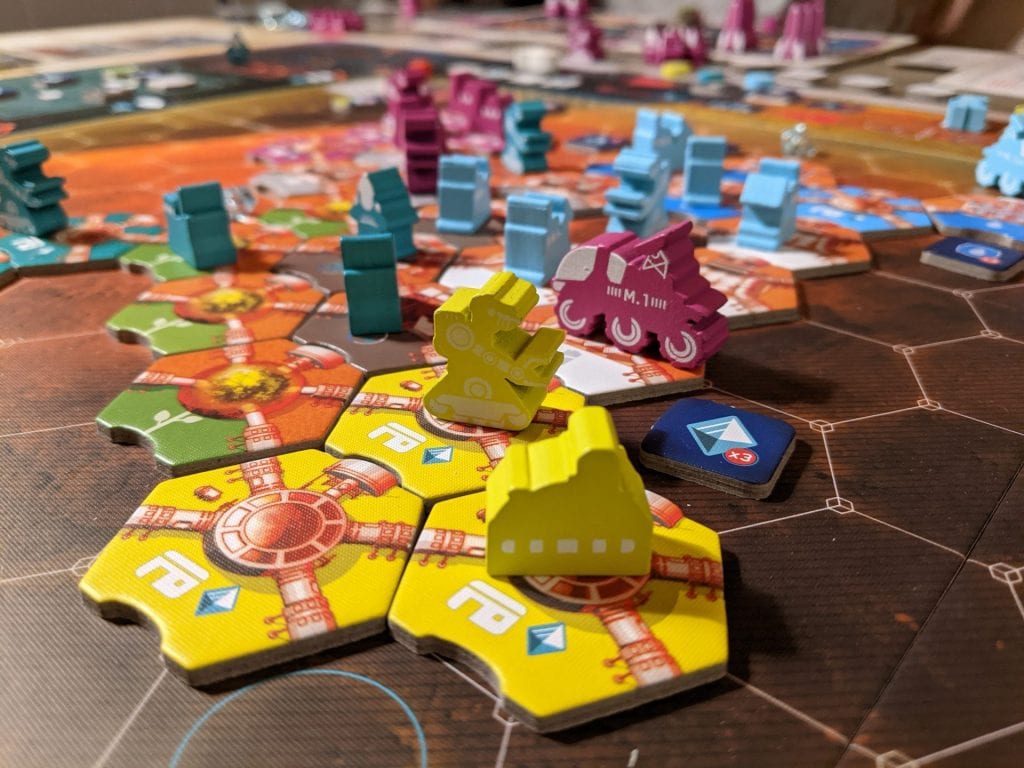
On Mars (2020, Eagle-Gryphon Games)
I love On Mars, but after a recent play, I had to admit it to myself—it’s a game that might be too hard to table regularly, meaning it is trade bait to move out of the collection.
On Mars, according to BGG’s “Weight Rating”, is the heaviest game in my collection at a 4.67 out of 5.00. It’s a game that I usually play once, maybe twice, a year, usually at the suggestion of another person in my heavy strategy gaming group. I always have to watch Paul Grogan’s teach video to refresh myself on the rules, and after 40 minutes of just watching the video, my brain is fried.
Still, On Mars is fantastic. When you are able to pull off a series of moves in On Mars that put you in a winning position, there’s something magical about how it feels. The production, like almost every Eagle-Gryphon game I have played, is amazing; just staring at my thick player board while moving crystals off of it or meeples onto it, is something else.
The problem (or maybe that’s “problem”) is that On Mars is a long play, even with experienced players. At the full four-player count, you are looking at a three-hour game with most players; even the speedy players make it a brain-burny 2.5-hour experience. That isn’t long, but it usually leaves me wanting to play a trick-taking game before going to bed to ease the mind.
I’m holding onto my copy of On Mars for now…but it wouldn’t shock me if it’s a goner in an upcoming math trade. At least six of my friends own a copy, so maybe I’ll just play theirs!
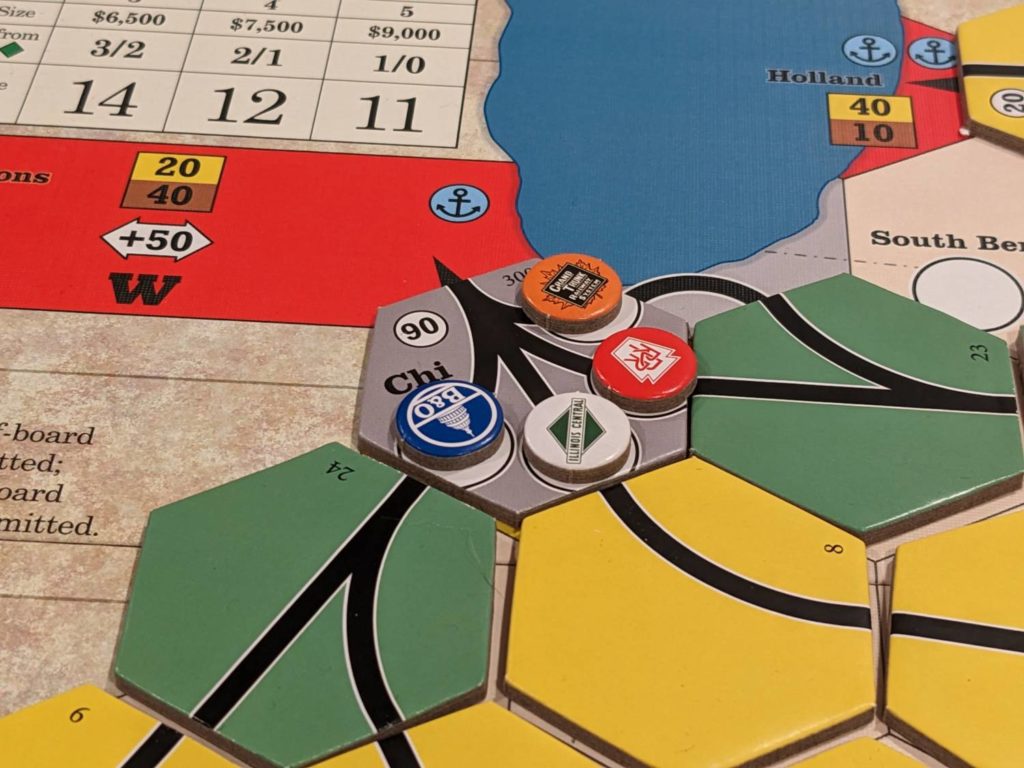
18XX games (any of them)
I currently own five 18XX games: 1830: Railways & Robber Barons, 1846: The Race for the Midwest, 1880: China, 1861: Railways of the Russian Empire, and 1867: Railways of Canada (these last two games are a part of the same box).
I am really digging 18XX games right now, but even I have to admit that these games are a tough sell job:
“Anyone down for a 5-7 hour game of 1880: China? Oh, you don’t know the 18XX system? Well, I could teach you that, then teach you all the ways that 1880 varies from the commonalities of the system. The teach will take about an hour, then we’ll do a private company auction that will probably take 20-30 minutes. Then, we’ll pick and par our opening major companies, and after I set up the tile selection area then we can really dig into the map…”
For most strategy gamers, the rules of an 18XX game aren’t really that bad. It’s the time commitment, then the math. OH MY GOODNESS, the math. As much as I have loved my plays of 18XX games, it’s a tough nut to crack. How do I convince people that the boring-looking board and the route calculations are a part of a rich gaming experience?
So far, I haven’t cracked the nut consistently, so my 18XX games mostly stare back at me from their place on the shelves. Conventions are the best way to get these plays in, but that’s only possible a couple of times a year. If you are in Chicago and love train games, drop me a note in the comments! Please!
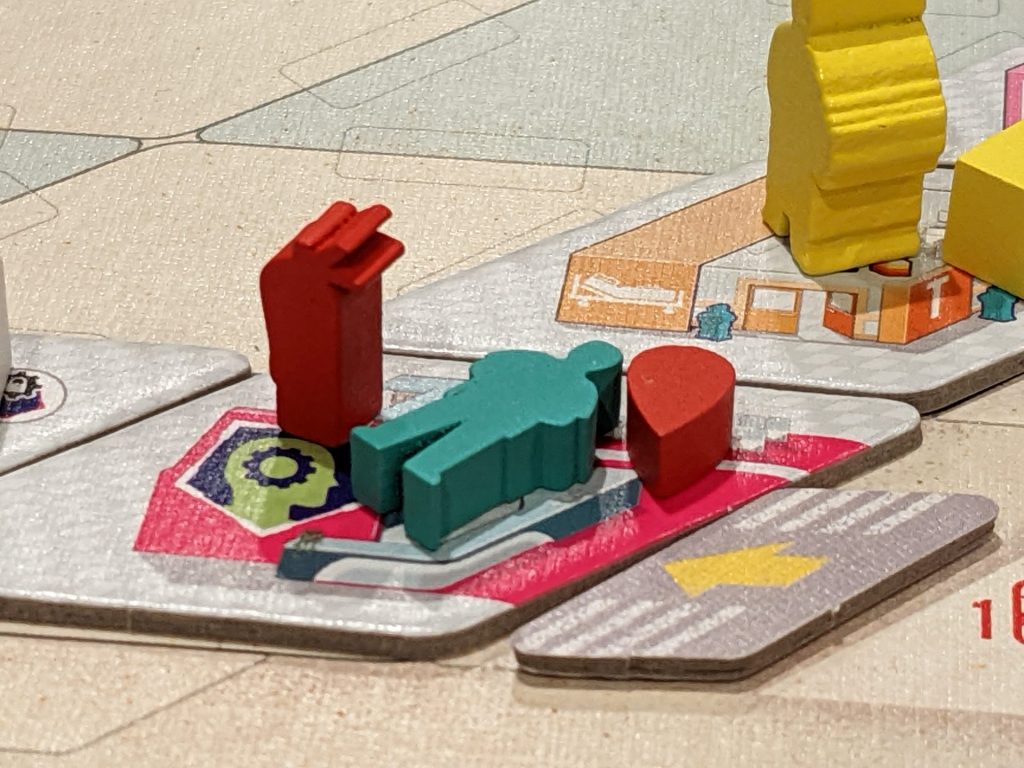
Clinic: Deluxe Edition (2019, currently published by Capstone Games)
With some games, no matter how much I like them, tabling them comes down to one thing: the teach.
And of all the games in my collection (including On Mars, which is really saying something), Clinic is the toughest game to teach. I’m not sure it is even close.
The rules are dense; Clinic’s rulebook does as good a job as it can to teach some fairly difficult gaming concepts. The spatial elements are the tough part; most people who play Clinic struggle to understand how the various platforms stack from floor to floor, plus all of the edge-case rules on where these platforms can be placed. The way patients move, the way everyone drives a car to the clinic (including the staff!), the way these platforms have staff limits…there’s just a ton to consider.
The only thing worse than the teach? The re-teach. You are going to be correcting players and explaining the game’s concepts over and over again to new players. While most games benefit from having the same group playing it consistently, Clinic is maybe the only game I currently own that I will NOT play unless everyone at the table has played at least once.
And that’s critical, because the game is such a rich puzzle.
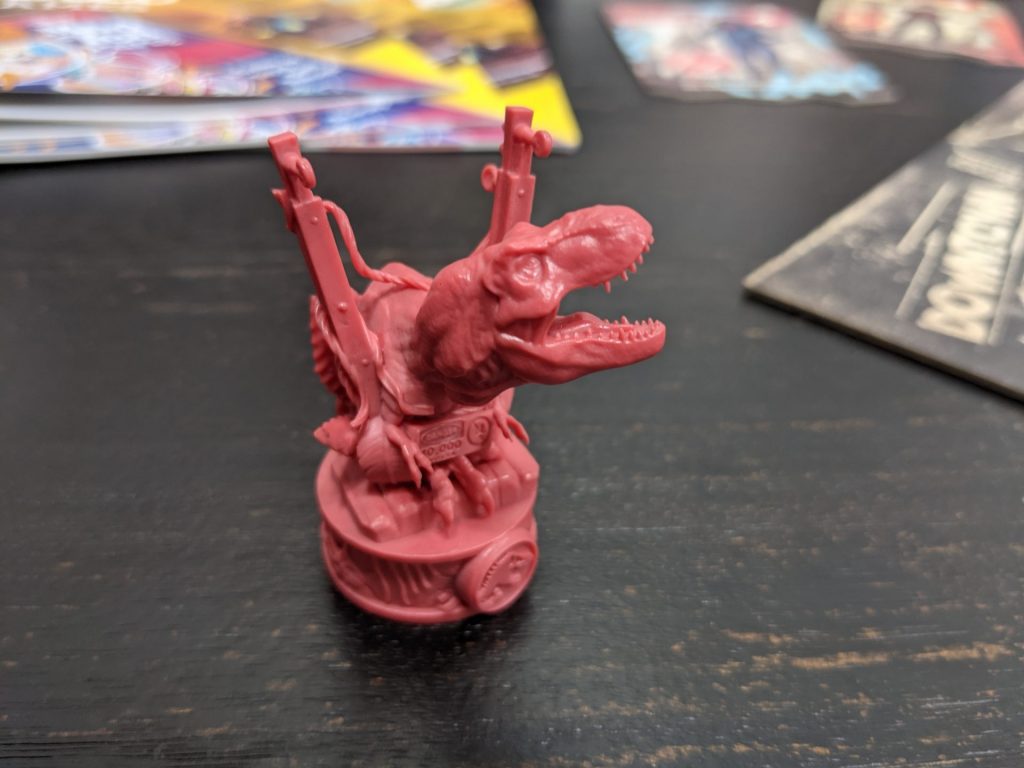
Forgotten Waters…Or, Really, ANY Campaign Game (2020, Plaid Hat Games)
I can still remember the first—and last—game of Forgotten Waters that I played.
It was early COVID, late in 2020. A new gaming group was being formed and I didn’t want to miss out on the chance to play a campaign game when there was so little going on in the world at that time. One of the players suggested, then bought, Forgotten Waters and five of the new group members jumped at the chance to play a pirate campaign game.
That one game was fantastic, even if it was a little too easy to beat the intro mission. Loved having characters. REALLY loved how well the app added atmosphere to the proceedings. The manual was a dream, the way everything happened on a couple of the pages and brought the scenario to life.
Then…we never played it again. No one even suggested playing it again. I’m still not sure if a couple players realized that it is a campaign game in the first place!
This is the curse of any campaign game—the moment when a game ends, you essentially have to schedule a second (or recurring weekly) session to ensure that it gets back to the table.
But for our group, life slowly began to reopen in the weeks after this first play. In Chicago, that meant access to a few restaurants. Some people began to go back to (gulp!) offices. We agreed that all of the original players needed to get back together, which proved to be a barrier that could not be overcome.
And until recently, I hadn’t even thought about the game a second time. Campaign games are the only category that I actively avoid reviewing for Meeple Mountain because the desire to see the entire game through is just too much, particularly when so many variables have to be just right to play. To those who are able to knock out a Frosthaven, Pandemic: Legacy or Jurassic World: The Legacy of Isla Nublar campaign of 10-15 games without issue—we salute you. (Bonus points if you’re able to manage having more than one of any campaign game going on at the same time!!)
***
What games do you struggle to get to the table most? Share your stories in the comments, please!


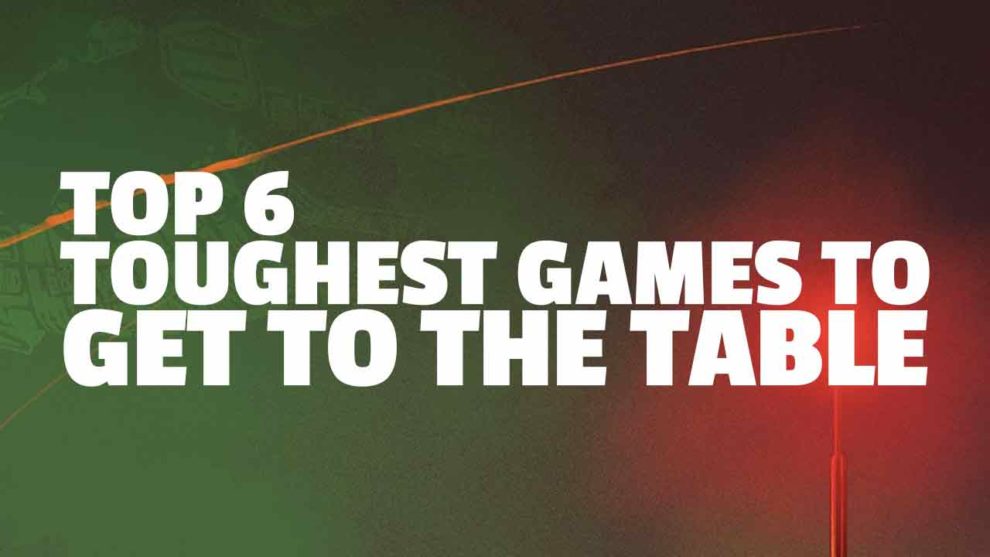





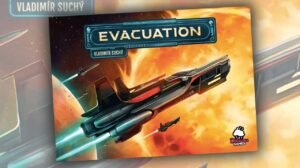

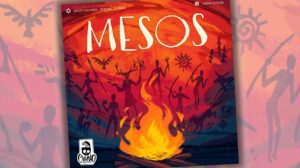





I feel your pain, Justin!
I cannot tell you how excited I about Pandemic Legacy when it was first released. My group liked the original, as well as all the expansions I had bought. I thought, this would be an easy game to get to the table.
When I mentioned it to the group, one of them flatly rejected it, saying he couldn’t imagine wanting to play the same game 12 times in a row (or more). My explanations of the differences in gaming sessions were all for naught.
Then, a few years later, he told me about how he and his wife were gaming with another couple and the husband excitely brought Pandemic Legacy to the table.
We don’t even mention that at our gaming sessions.
I daydream about getting clinic to the table more often… so I feel your pain.
Way of the Ring. Like many on your list, too long and too rules intense. Loved the time I played, but I can never table it.
Do you mean War of the Ring? If so, yeah…it’s a big boi
Twilight Imperium 4th ed. 6 people coordinating a common, free, 10 hour period of time? Most with families?You’re lucky if you can swing once a year. 😔
My #1 is On Mars, and it gets played regularly. The key is teaching it to three regulars. The genius of the game will demand that it comes out.
I don’t have any of the huge ones, but even Firefly is a struggle to get through, and the sessions NEVER go as fast as the setup cards indicate.